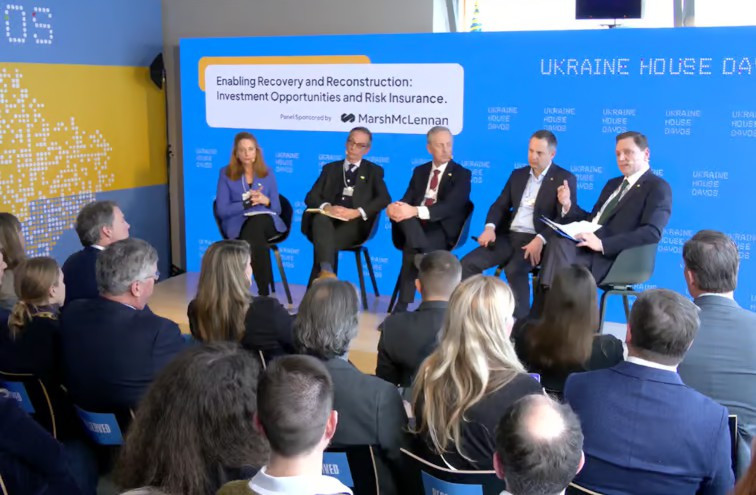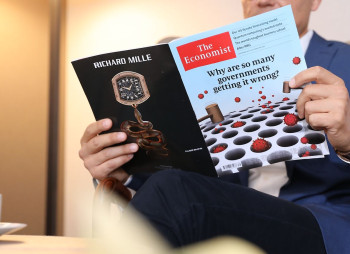Financial services leaders, along with a representative of the Ukrainian government, have shone a spotlight on the need for war risk solutions to facilitate Ukraine’s recovery at a panel in Davos, Switzerland.
Organized by Ukraine House Davos and sponsored by Marsh McLennan, the panel tackled economic initiatives and priorities to build a better Ukraine and the keys to unlocking such investments.
Rostyslav Shurma, deputy head of the office of the President of Ukraine, said there is “almost zero” commercial investment in the country due to the ongoing military risk. He lamented that a “unique” solution for this risk is not currently commercially available.
“Even those who see the business opportunities in multiple segments are not ready to commit with their own equity,” Shurma told the audience during Thursday’s (January 18) panel.
“The major thing holding this back is absolutely clear. This is about the uncertainty in the military risk.”
War risk a significant hindrance to Ukraine investment
Julie Monaco, global head of public sector banking, capital markets and advisory division at Citigroup agreed that Ukraine’s technology, infrastructure, and agriculture sectors needed investment. She called for more commercial solutions to address the war risk, keeping private investment away.
“We need more war insurance,” Monaco said. “We have certain parts of sectors and clients where we don’t have concerns about the credit risk. We have concerns about war and destruction.”
Additionally, donor governments and international financial institutions would need to collaborate to help “achieve scale” in some of the reconstruction projects.
“There are discussions about a multi-donor platform, but we’re going to need a way to pull together our capabilities to get larger projects done because right now, you couldn’t get a $100 million project, so everything that’s happening is small,” she said.
“If we put our minds together and focus on these problems, we could get some of these projects done this year while the war is still happening.”
Addressing the regulatory hurdles, Shurma said the Ukrainian government was working hard to bring down barriers for private companies to do business in the country.
“The military risk and the permanent access to the market is 90% of the issue,” Shurma said.
“We have a lot of regulatory problems. We have some problems with the rule of law, as in any other country, and we need to fix them. But nothing will change until we fix the military situation.”
Attracting insurance capital key to Ukraine reconstruction
During the panel, Marsh McLennan CEO John Doyle highlighted the insurance giant’s efforts to help attract insurance capital into Ukraine, including its data platform for war risk analysis and the “Unity” grain cargo insurance facility to encourage trade from Ukrainian ports.
According to Doyle, Marsh McLennan’s most recent priority had been getting shipping insurance in place so that grain and other food shipments could go through the Black Sea.
Aside from marine cargo insurance, Marsh McLennan is also focused on enabling insurance solutions for other commodities and helping restore air travel in Ukraine.
“The government has an incredible amount of data to digitize. We worked with the government to put that data together in a way that we think we can use to help attract insurance capital and, ultimately, investment capital to the market,” said Doyle.
“We also know travel and enabling travel into the country is critical. We know there’s some work we can do and some progress we can make on that. Restoring air travel to the country will have an important economic impact.”
The CEO also emphasized that the “Unity” facility can be a blueprint for future public-private partnerships with Ukraine.
“We’re proud to be trying to be part of the solution here,” Doyle said. “Insurance is the backbone of many economies and, ultimately, will attract capital and investment into any market around the world.”
Is Ukraine getting lost in the global agenda?
The ongoing 2024 World Economic Forum in Davos has been crucial to bringing attention back to Ukraine. Sharma acknowledged that other geopolitical and global events had pulled some focus away from the conflict.
“After the Middle East conflict and many other developments, like AI, accelerated in the world, it’s really important to keep Ukraine in focus,” Shurma said. “I think everybody understood that we were losing focus and momentum during the last half of the year.”
But Andy Hunder, president of the American Chamber of Commerce in Ukraine, who was moderating the panel, emphasized the importance of Ukraine’s recovery to the global economy.
“It’s seen as a risk to invest in Ukraine, but it’s even riskier not to invest in Ukraine,” Hunder said.






